Supreme Court prorogation appeal: What could the judges decide and when will the verdict be released?
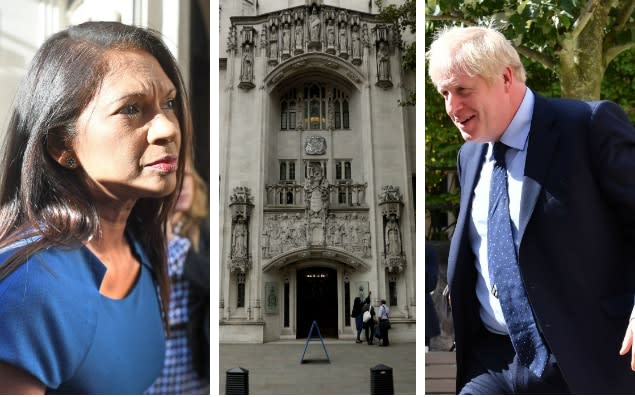
The Supreme Court in London has heard historic appeals from two separate challenges brought in England and Scotland to the prorogation of Parliament.
Now, Boris Johnson faces a wait for a ruling from the UK's highest court over his advice to the Queen to suspend Parliament for five weeks.
The Court has been asked to determine whether the prorogation move - which has closed down Parliament until October 14 - was unlawful.
A panel of 11 justices heard appeals over three days arising out of separate legal challenges in England and Scotland, in which leading judges reached different conclusions.
At the close of the unprecedented hearing on Thursday, the court's president Lady Hale said the judges hope to give their decision early next week.
She said: "I must repeat that this case is not about when and on what terms the United Kingdom leaves the European Union.
"The result of this case will not determine that. We are solely concerned with the lawfulness of the Prime Minister's decision to advise Her Majesty to prorogue Parliament on the dates in question.
"As we have heard, it is not a simple question and we will now carefully consider all the arguments that have been presented to us."
Depending on the legal basis upon which the judges reach their conclusions, Parliament may have to reconvene if Mr Johnson - who has refused to rule out a second suspension - loses the case.
What happened in court?
On Tuesday, the first day of the hearing, Mrs Miller's barrister Lord Pannick QC argued that Mr Johnson's motive for an "exceptionally long" prorogation was to "silence" Parliament, and that his decision was an "unlawful abuse of power".
A cross-party group of around 75 MPs and peers, led by SNP MP Joanna Cherry QC, was responsible for the Scottish challenge and the appeal against the Court of Session's decision is being brought by the Advocate General for Scotland, Lord Keen QC, on behalf of the Westminster Government.
Lord Keen submitted that the courts "must not cross the boundaries and intrude upon the business of Parliament", and confirmed Mr Johnson would comply with the Supreme Court's ruling if it finds his decision was unlawful.
On Wednesday, Sir James Eadie QC, representing Mr Johnson, argued that the Supreme Court had no jurisdiction to rule on the lawfulness of the length of prorogation, following submissions from Aidan O'Neill QC for Ms Cherry.
Mrs Miller's challenge is supported by former prime minister Sir John Major, shadow attorney general Baroness Chakrabarti and the Scottish and Welsh governments, who are all interveners in the Supreme Court case.
Sir John, who was in Number 10 from 1990 to 1997, said on Thursday: “It is unlawful for a decision maker to exercise a power for a particular stated purpose while in fact having an ulterior motive.”
He said his behaviour was similar to teachers being dismissed on educational grounds when the real reason was to save money, or a local authority seeking “to acquire land for its benefit when its true motive was to remove gipsies from the land”.
When will the verdict be released?
There is no way of knowing yet what the Supreme Court will decide, or even how it might issue its verdict.
When Lord Pannick asked judges to issue an initial view on whether Parliament should be recalled next week before any fuller verdict later on, his request was firmly brushed off by the President Baroness Hale, who said: "Make no assumptions".
Their decision, she said, would happen as quickly as "humanly" possible – but she indicated that it would not come until early next week, which may suggest that they are not about to issue a snap demand to recall Parliament.
What could the judges decide?
If they side with the decision of the High Court and rule that judges have no place in interfering with purely political matters, then the suspension of Parliament will continue until October 14 and the Prime Minister can breathe a sigh of relief.
But if they decide that the prorogation was unlawful, then Parliament could be recalled.
Lord Keen said the Prime Minister will comply with the Supreme Court's ruling if it concludes his advice to the Queen was unlawful - but refused to rule out the possibility Mr Johnson may advise the monarch to prorogue Parliament for a second time.
The 11 judges who will rule on Parliament suspension
These are the 11 Supreme Court judges who will consider legal challenges to Prime Minister Boris Johnson's decision to suspend Parliament:
Lady Hale
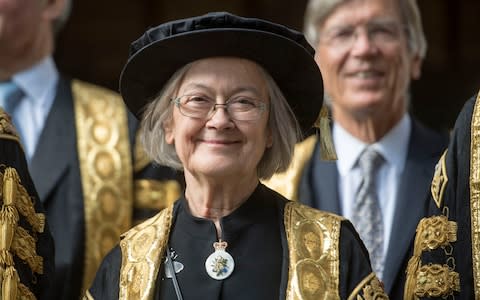
Lady Hale, 74, was appointed the first female president of the Supreme Court in 2017 after a varied career as an academic lawyer, law reformer and judge.
A long-standing champion of diversity in the judiciary, she became the first female justice of the court in October 2009, and was appointed deputy president in June 2013.
During her time as deputy president, Yorkshire-born Lady Hale ruled on numerous high-profile cases, including the Brexit appeal.
Lord Reed
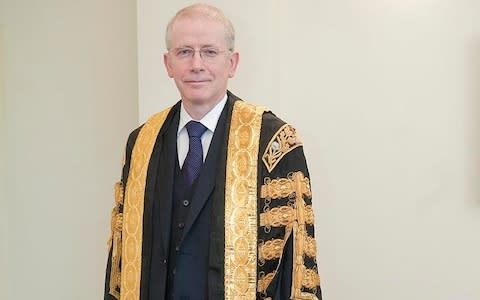
Lord Reed, 63, was appointed deputy president of the Supreme Court in June last year and will replace Lady Hale when she retires in January.
One of the court's two Scottish justices, he previously served as a judge in Scotland and sometimes sits as a judge at the European Court of Human Rights and the Hong Kong Court of Final Appeal.
He was educated at the universities of Edinburgh and Oxford before qualifying as an advocate in Scotland and a barrister in England and Wales.
Lord Kerr
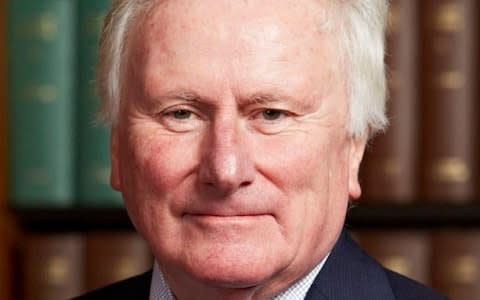
Lord Kerr, 71, is the first justice of the court to come from Northern Ireland, where he served as Lord Chief Justice from 2004 to 2009.
Educated at St Colman's College, Newry, and Queen's University, Belfast, he was called to the Bar of Northern Ireland in 1970, and to the Bar of England and Wales in 1974.
Lord Wilson
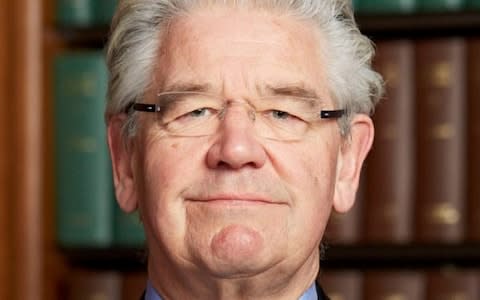
Lord Wilson, 74, was appointed in 2009, having previously been a judge in the High Court's family division and the Court of Appeal.
Lord Carnwath
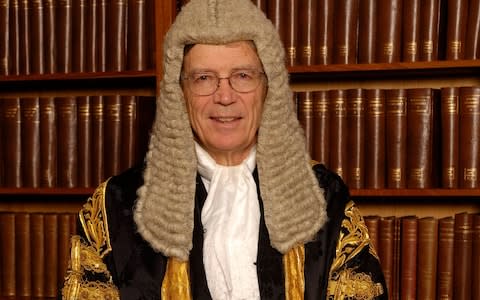
Lord Carnwath, 74, studied at Cambridge and was called to the Bar in 1968. He served as Attorney General to the Prince of Wales from 1988 to 1994.
While a judge of the Chancery Division, he was also chairman of the Law Commission and, between 2007 and 2012, was Senior President of Tribunals.
Lord Hodge
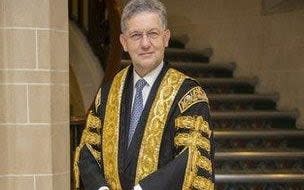
Lord Hodge, 66, the court's other Scottish justice, was previously the Scottish judge in Exchequer Causes, one of the Scottish intellectual property judges, a judge in the Lands Valuation Appeal Court and a commercial judge.
Lady Black
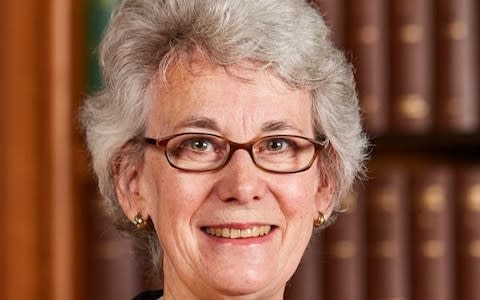
Lady Black, 65, a justice since 2017, carried out a broad range of civil and criminal work during her early career as a barrister before specialising in family law.
She has served as a High Court judge and Lady Justice of Appeal.
Lady Black taught law at Leeds Polytechnic in the 1980s, was a founding author of the definitive guide to family law practice in England and Wales, and continues to serve as a consulting editor.
Lord Lloyd-Jones
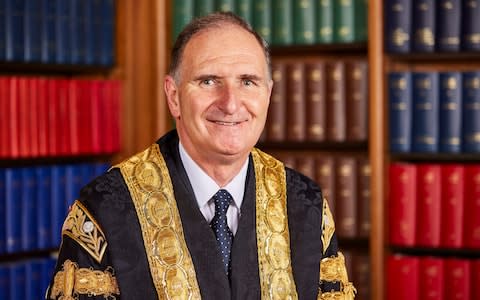
Lord Lloyd-Jones, 67, was born and brought up in Pontypridd, South Wales, where his father was a school teacher, and is the court's first justice to come from Wales.
A Welsh speaker, he was appointed to the High Court in 2005, and acted as adviser to the court in the Pinochet litigation before the House of Lords.
Lady Arden

Lady Arden, 72, who grew up in Liverpool, began her judicial career in 1993 after working as a barrister, QC, and Attorney General of the Duchy of Lancaster.
She became a member of the Permanent Court of Arbitration in The Hague in 2011, and sits as a judge of the European Court of Human Rights in Strasbourg.
Lord Kitchin

Lord Kitchin, 64, was called to the Bar in 1977 and his practice covered intellectual property, including patents, trademarks, copyright, designs and trade secrets.
He has also served as a High Court judge and as a Lord Justice of Appeal.
Lord Sales
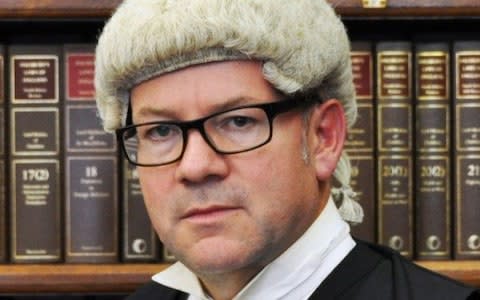
Lord Sales, 57, is the youngest of the court's justices and was appointed in January, having worked as a barrister and QC before his appointment to the High Court in 2008.
He was vice-president of the Investigatory Powers Tribunal, served as deputy chairman of the Boundary Commission for England and was appointed as a Lord Justice of Appeal.
The key players
These figures will be front and centre this week, so here's a reminder of the key players.
Gina Miller
The investment fund manager and campaigner first came to public prominence in 2016 when she launched a legal challenge to then prime minister Theresa May's decision to use the royal prerogative to trigger Article 50, starting a two-year countdown to the UK's departure from the EU.
The High Court ruled that the prime minister did not have the power to trigger Article 50 without the authority of Parliament, a ruling ultimately upheld by the Supreme Court in January 2017.
Boris Johnson
Mr Johnson was appointed Prime Minister on July 24, after refusing to rule out proroguing Parliament during the contest to succeed Mrs May as leader of the Conservative Party.
The Queen prorogued Parliament, on Mr Johnson's advice, on August 28 after Commons Leader Jacob Rees-Mogg, Lords Leader Baroness Evans and chief whip Mark Spencer flew to Balmoral for a Privy Council meeting.
A handwritten note of Mr Johnson's dated August 16, replying to advice on prorogation, said Parliament sitting in September was a "rigmarole introduced ... to show the public that MPs were earning their crust, so I do not see anything especially shocking about this prorogation".
An unredacted version of the note leaked to Sky News revealed Mr Johnson wrote that the "rigmarole" had been "introduced by girly swot (former prime minister David) Cameron".
Joanna Cherry QC MP and others
Joanna Cherry, a barrister-turned-MP and the SNP's justice and home affairs spokeswoman, is the lead claimant in the proceedings brought in Scotland.
The case is brought by a total of 79 petitioners, including Lib Dem leader Jo Swinson, Green Party MP Caroline Lucas and Plaid Cymru's Westminster leader Liz Saville Roberts.
Sir John Major
Sir John served as prime minister between 1990 and 1997, taking over from Margaret Thatcher and defeating Labour leader Neil Kinnock in the 1992 general election before losing to Tony Blair's New Labour in 1997.
In July, after Mr Johnson refused to rule out prorogation, Sir John told BBC Radio 4's Today programme that it would be "utterly and totally unacceptable" for any British premier to shut down Parliament.
The former prime minister said he would bring a judicial review against any attempt to do so and intervened in Mrs Miller's High Court case in September. His lawyers have been given permission to make oral submissions at the Supreme Court hearing.
However, Sir John himself controversially prorogued Parliament ahead of the 1997 general election, which prevented a report on the cash for questions scandal being considered by MPs.
Baroness Chakrabarti
The peer was director of civil liberties organisation Liberty from 2003 to 2016, during which time she was described by the Sun newspaper as "the most dangerous woman in Britain".
Following her appointment in 2016 as the chairwoman of an inquiry into anti-Semitism in the Labour Party, Baroness Chakrabarti was nominated to the House of Lords and subsequently appointed Labour's shadow attorney general.
Raymond McCord
The victims' rights campaigner, whose son was murdered by loyalist paramilitaries in 1997, is one of three individuals bringing a legal challenge in Belfast, arguing that a no-deal Brexit would damage the Northern Ireland peace process.
Unlike in England and Wales and Scotland, cases in Northern Ireland cannot leapfrog straight to the Supreme Court, so Mr McCord's case was heard by the Court of Appeal in Belfast on Monday - and he has also been given permission to intervene at the Supreme Court.
The Supreme Court justices
For only the second time in the court's history, an 11-strong panel of justices will hear the joined cases - the first time being Mrs Miller's Article 50 case.
The panel will be headed by Supreme Court president Lady Hale and also includes deputy president Lord Reed, who will become president in January when Lady Hale retires.

 Yahoo News
Yahoo News 
